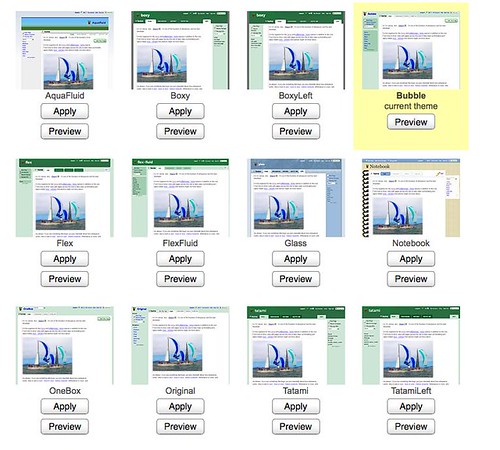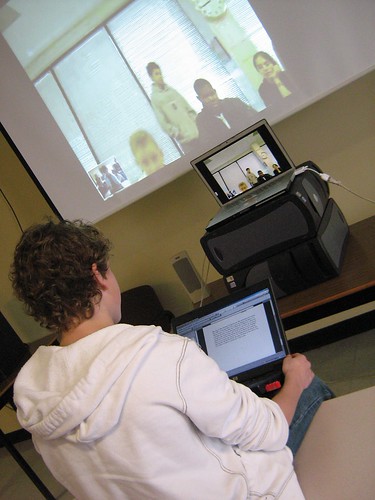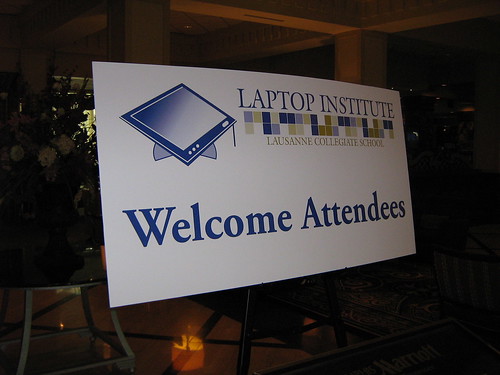A good idea is always worth stealing – and modifying. Take last Thursday as a case in point.
We always struggle to make professional development days at school engaging. Too many times we have been reminded as teachers of the sheer torture we put students through each and every day by having a “sit and get” style of presentation, where one person who has been identified as an expert makes a presentation to the whole group on something they might deem as important. Rarely is it engaging, much less relevant.
 As we pondered a couple of weeks ago about how to approach this upcoming day, I was reminded by my colleague Kim Cofino at the International School of Bangkok that there are many experts in our midst. She wrote recently about their staff’s recent experiences with “speed-geeking”, where teachers were exposed to a variety of strategies and tools from a number of staff members over a short period of time.
As we pondered a couple of weeks ago about how to approach this upcoming day, I was reminded by my colleague Kim Cofino at the International School of Bangkok that there are many experts in our midst. She wrote recently about their staff’s recent experiences with “speed-geeking”, where teachers were exposed to a variety of strategies and tools from a number of staff members over a short period of time.
We decided to take that approach one step further. We based a part of Thursday’s PD sessions on the “speed-dating” model now being used across the globe as a means of meeting potential partners. It is often said that you can tell pretty quick whether someone is worth the effort. We were interested if the same could be said for new teaching strategies, tools and projects.
Not having and first-hand knowledge of speed-dating, our model was based purely on perception of a process. That being said, it worked out pretty well.
We started with Chris Lehmann’s “Schools We Need” presentation from the IgnitePhilly series. This was meant to generate some mental juices surrounding the idea of school change and what it could really look like.
Teachers were then broken into groups of two. A timer was put on the SMART Board and set at six minutes. Teachers were told they had three minutes to show their partner one new practice, project, assessment, etc. that they have introduced into their classroom in the past year. They then had three minutes to listen to their colleague’s idea. Then one rotated to the next table while one stayed.
Teachers were not expected to focus on technology-based ideas. In fact, they were told that innovation did not have to be centered on their laptops. That being said, most of the new practices were made possible by teacher laptops and student 1:1 programs.
This was not meant to dig deep into the process or practice. We felt that, like speed-dating, one would be able to assess pretty quickly if there was anything of interest there for them. They could follow up at a later date if they wanted more details. We were looking for two outcomes; teachers would be exposed to six new ideas (we did six rounds in 45 minutes) and teachers received an implicit message that they should be looking at new practices on a continual basis.
Thanks Kim. I know you won’t mind the remodel.
Technorati tags: technology, education, whipple, learning, Kim Cofino
Photo: img_4042, Uploaded to Flickr on September 7, 2006 by Urban Mixer

 Now comes a whole new slew of templates. It used to be that wikis were pretty limited on being pretty, but now the design team has introduced a whole new suite to their look and feel department, and it’s being met with open arms by teachers and students. The new designs give a range of looks that allow learners to tweak their wiki to better serve their learning objectives.
Now comes a whole new slew of templates. It used to be that wikis were pretty limited on being pretty, but now the design team has introduced a whole new suite to their look and feel department, and it’s being met with open arms by teachers and students. The new designs give a range of looks that allow learners to tweak their wiki to better serve their learning objectives. For the second year in a row, some of our Grade 8 french students were involved in a student project with students at the
For the second year in a row, some of our Grade 8 french students were involved in a student project with students at the  They have exchanged ambassadors – which will be unveiled next week – and will begin a month long “visit” which will be documented and shared back to the other class in video format, all narrated en francais. Again, a project wiki will serve as the primary tool. You can
They have exchanged ambassadors – which will be unveiled next week – and will begin a month long “visit” which will be documented and shared back to the other class in video format, all narrated en francais. Again, a project wiki will serve as the primary tool. You can 
 My favorite place in the whole world is Matthew’s Head in Fundy National Park (see photo).
My favorite place in the whole world is Matthew’s Head in Fundy National Park (see photo). This summer, 14 of our staff will be representing the great work of their colleagues as we share our collective story as the 2009 Spotlight School at the
This summer, 14 of our staff will be representing the great work of their colleagues as we share our collective story as the 2009 Spotlight School at the  “Why do we write exams? They are kind of like cheating. They don’t measure what we know. They give us all this information, we memorize it, we write it on the paper and then forget it. We don’t really learn anything.”
“Why do we write exams? They are kind of like cheating. They don’t measure what we know. They give us all this information, we memorize it, we write it on the paper and then forget it. We don’t really learn anything.” What’s amazing is that teachers who are signing up for an educational service provided by an external company would use such handles for their username. It reminds me of the various email addresses provided by adult students in the undergrad Education course I taught the last two years at the local university. Many contained strong imagery – with various takes on “sexy” thrown in – and were far from professional. I didn’t say anything to any of them, but thinking back, I think I failed them somewhat by not having the conversation about professionalism and digital citizenship.
What’s amazing is that teachers who are signing up for an educational service provided by an external company would use such handles for their username. It reminds me of the various email addresses provided by adult students in the undergrad Education course I taught the last two years at the local university. Many contained strong imagery – with various takes on “sexy” thrown in – and were far from professional. I didn’t say anything to any of them, but thinking back, I think I failed them somewhat by not having the conversation about professionalism and digital citizenship.